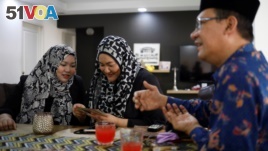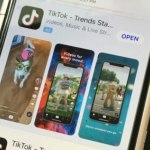03 November 2020
In the modern nation of Singapore, several average people working in offices or driving taxis claim to be of royal blood. They say they are descendants of a 19th century ruler who gave up the island to the British.
But few members of Singapore's cities know about their true royal past. This is difficult for Tengku, or Prince Shawal. He is considered by some members of his family as the leader of "the house of Singapore'.

Tengku Shawal, a royal descendant, talks as his daughter Tengku Puteri (L) and his sister Tengku Intan (C) reminisce over old family photos at Intan's home in Singapore August 21, 2020. (REUTERS/Edgar Su)
"They still exist?" is the answer the 51-year-old says he often receives when he tells people he is one of the descendants of Sultan Hussein Shah. Hussein Shah signed treaties with Britain that led to colonial rule. Singapore became an independent city-state in 1965.
Shawal is one of several Singaporeans who have the royal name Tengku. It means prince or princess in Malay. They claim links to the Sultan.
Until about 20 years ago, possibly 14 of them still lived in their ancestral home, a crowded and damaged palace. They were removed from the home by the government, which turned it into a museum.
At the time, the government said about 79 descendants were offered money as part of a colonial-period agreement to provide for the Sultan's family. Many of the others were living in other countries, it said.
The descendants' names were not made public, making it difficult to know who really is royalty. The government told Reuters that all but one of the payments have been made.
‘Not a dynasty'
Shawal showed Reuters letters from the government that identified him as a descendant. He said he often visits the palace that was turned into a museum.
He faces personal problems because of the coronavirus pandemic. But, Shawal said he tries to keep the Sultan's history alive by wearing traditional royal clothing and attending celebrations.
Other descendants warn about the dangers of living in the past or are too busy with their normal lives. "We are not a dynasty. It is not important whether you are a descendant of the royal family or not," said Tengku Indra. Now 67, he lived in the palace as a child.
Indra was described as the great-great-great-great grandson of Sultan Hussein in an article by the government organization Friends of the Museums Singapore last year.
Indra's son is 40-year-old businessman Tengku Azan. He has a two-year-old daughter who would be one of the youngest descendants.
He thinks future generations will not take much interest in the Sultan's history. "The past...remains uncherished," he said.
For others who lived in the former palace, life in the outside world was difficult. Tengku Faizal said after he left the palace in 1999 he took a job as a cleaner in an apartment building. He was often called the prince who deals with the waste.
He now drives a taxi, but said he is struggling to make enough money. To help out, his wife works a part-time job at McDonald's. "We are not smart, we are not rich," Faizal said, speaking in English.
Of seven Singapore claimants Reuters talked to, Shawal was the most interested in celebrating his history.
But even he had his own doubts about passing on the royal name. He did not give it to his daughter when she was born.
I'm Susan Shand.
The Associated Press reported this story. Susan Shand adapted it for Learning English. Mario Ritter was the editor.
Words in This Story
descendant– n. someone who is related to a person or group of people who lived in the past
palace– n.the official home of a king, queen, or royalty
pandemic– n. the fast spread of an infectious disease over a very large geographical area
dynasty– n. a family that rules over a country over a long period of time
uncherished– adj. to remember or hold an idea, belief or thought in a deeply felt way
apartment building.–n. a large building that has many apartments, or hom











